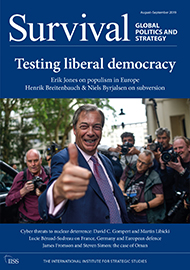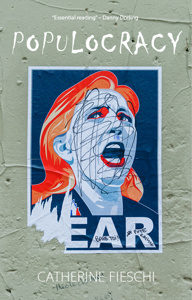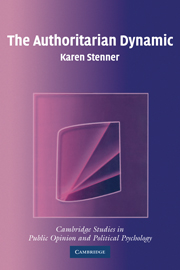 Trust in democratic institutions to resolve conflicts fairly is at odds with the populist notion of democracy as the expression of the unified will of the one true people. Populist governments can weaken existing institutions in two different ways, argues Erik Jones, Director of European and Eurasian Studies at Johns Hopkins University’s Paul H. Nitze School of Advanced International Studies (SAIS):
Trust in democratic institutions to resolve conflicts fairly is at odds with the populist notion of democracy as the expression of the unified will of the one true people. Populist governments can weaken existing institutions in two different ways, argues Erik Jones, Director of European and Eurasian Studies at Johns Hopkins University’s Paul H. Nitze School of Advanced International Studies (SAIS):
- Firstly, they can staff public institutions with people who are either incompetent or uninterested in actual policy. ….
- Alternatively, populist political movements can attempt to change their country’s constitutional arrangements to make them less pluralistic. As [Ivan] Krastev explains: ‘populist and radical parties aren’t just parties; they are constitutional movements. They promise voters what liberal democracy cannot: a sense of victory where majorities – not just political majorities, but ethnic and religious majorities – can do what they please.’
 Whatever its origins, European populism may leave a lasting impression on social relationships, Jones writes for Survival, the journal of the International Institute for Strategic Studies. It has already changed political discourse in ways that allow greater scope for exclusionary language. This shift in language is not limited to identity politics. Populist political challengers also have a distinctive relationship with ‘truth’. This is the argument that Catherine Fieschi makes in Populocracy.
Whatever its origins, European populism may leave a lasting impression on social relationships, Jones writes for Survival, the journal of the International Institute for Strategic Studies. It has already changed political discourse in ways that allow greater scope for exclusionary language. This shift in language is not limited to identity politics. Populist political challengers also have a distinctive relationship with ‘truth’. This is the argument that Catherine Fieschi makes in Populocracy.
Envy and resentment are driving collectivist impulses around the world, says analyst Tom Palmer. Anxiety about status—in this case a perception of an inversion of the status quo—seems to be a major factor, certainly much bigger than ideological racism, he writes for Reason. As political scientist Karen Stenner argued based on extensive data in her book The Authoritarian Dynamic, threats to “collective rather than individual conditions” trigger authoritarian “groupiness,” i.e., populism.
 How does polarization help would-be authoritarians to win elections? Milan W. Svolik asks. New survey experiments in several countries suggest that many voters are willing to put their partisan interests above democratic principles—a finding that may be key to understanding democratic backsliding, he writes for the NED’s Journal of Democracy:
How does polarization help would-be authoritarians to win elections? Milan W. Svolik asks. New survey experiments in several countries suggest that many voters are willing to put their partisan interests above democratic principles—a finding that may be key to understanding democratic backsliding, he writes for the NED’s Journal of Democracy:
As Chávez, Putin, and Erdoğan have eroded democracy in their countries, they have done so with the tacit and sometimes explicit consent of significant portions—sometimes majorities—of their electorates. To be clear, this is not to exculpate autocrats. Only in rare instances have ordinary people actually demanded dictatorship, and even in those cases, these were small fractions of the public, as Nancy Bermeo has documented. But because democratic backsliding is a process that starts from a democratic status quo, ordinary people play a central role in it. They are indispensable, even if reluctant, accomplices. RTWT







